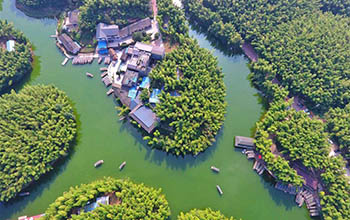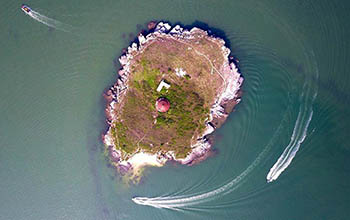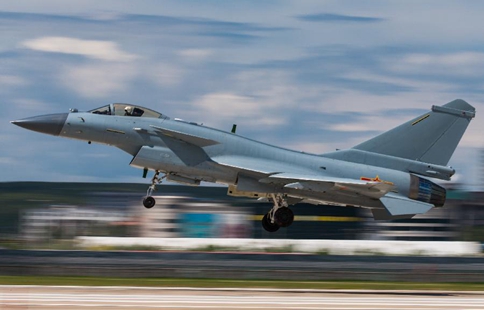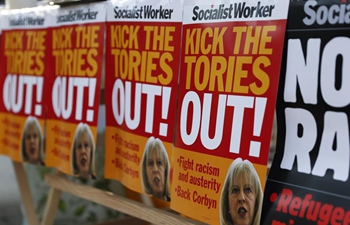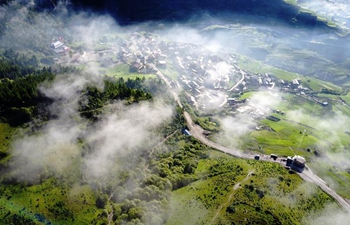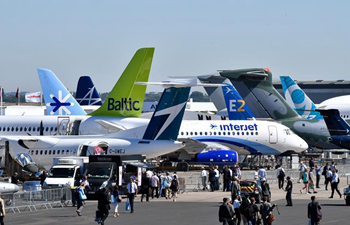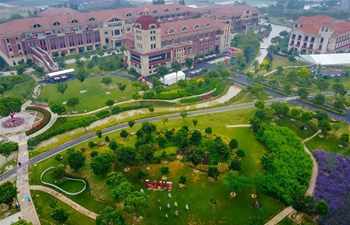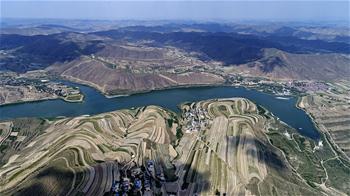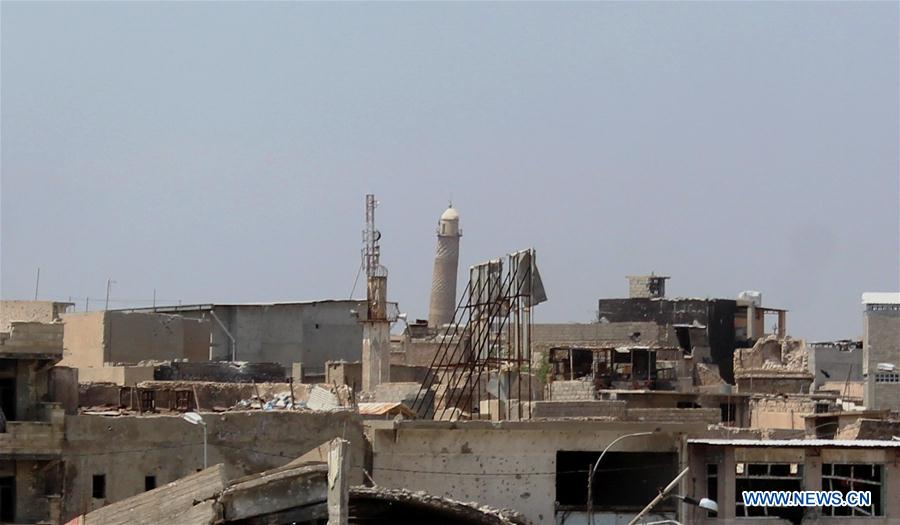
The minaret of Great Mosque of al-Nuri is seen from the liberated neighborhood in western Mosul, Iraq on May 7, 2017. The extremist Islamic State (IS) militants have blown up Mosul's historical Great Mosque of al-Nuri and its leaning minaret, as Iraqi forces are pushing near the Mosque area in the western side of Mosul, the Iraqi military said. (Xinhua/Khalil Dawood)
BAGHDAD, June 22 (Xinhua) -- The Islamic State (IS) militants bombed historical al-Nuri mosque on Wednesday during fierce battles against the Iraqi army which has retaken most of Mosul, the country's second largest city, after eight months of offensives.
Iraqi Prime Minister Hadier Abadi said "blowing up the al-Nuri mosque and the al-Hadba minaret is an official declaration of defeat by the Islamic State."
However, a victory in Mosul, or even in Raqqa of Syria, cannot uproot terrorism in the Middle East, nor prevent it from spreading to other regions. Power struggle may lead to more intense conflicts in post-IS era after the common enemy disappears, according to analysts.
OFFENSIVES AT FINAL STAGE
Mosul has been under IS control since June 2014, when government forces abandoned the city. IS militants have thus taken control of large swaths of territories in the country, with the city as their de facto capital in Iraq.
The Iraqi army launched operations to retake the city in October 2016, when commanders said they expected to announce victory by the end of the year. However, the offensives slowed down due to strong resistance by the IS militants.
Iraqi forces pushed closer to Mosul's historical al-Nuri mosque on Wednesday amid fierce clashes in IS-controlled areas which only account for less than 10 percent of the city.
"The commandos of the Counter-Terrorism Service (CTS) forces began progress at dawn toward al-Nuri mosque and the surrounding areas," a source from the CTS told Xinhua on condition of anonymity.
"After hours of fierce house-to-house battles, the troops seized some alleys and took new positions in the old city located some 100 meters away from al-Nuri mosque," the source said.
The progress was slowed by the stiff resistance of IS militants and a large number of roadside bombs and booby-trapped buildings, in addition to IS snipers who took positions in the buildings of heavily-populated neighborhoods.
The militants on Wednesday bombed al-Nuri mosque and its famous leaning minaret, which has great symbolic value for the group.
IS leader Abu Bakr al-Baghdadi proclaimed himself "caliph," or ruler of all Muslims and the cross-border "caliphate" in Iraq and Syria from the mosque's pulpit in his sole public appearance in July 2014.
According to UN reports, some 100,000 civilians are still trapped in the IS-held areas as the group is using the civilians as human shields.
CONFLICTS EXPECTED
"Recapturing Mosul and Raqqa would certainly break the back of the terrorist group, demolishing its self-declared state of Islamic 'caliphate' in Iraq and Syria," political analyst Ibrahim al-Ameri said.
After losing their strongholds, the IS group would retreat to tribal areas in the desert where the government's control is weak, and pick up guerrilla-style tactics to launch attacks in the region and across the world.
"Obviously, terrorism will continue in Iraq and Syria, even more significantly. It will rapidly extend its global reach," Ameri said.
"The IS will incite and organize attacks against its far enemies in Western countries and near enemies such as Iran, as part of its strategy to show the caliphate is not restricted in Iraq and Syria," he added.
During the past few weeks, the terrorist group claimed responsibility for a series of attacks in Britain.
The liberation of Mosul and Raqqa involved a variety of forces from regional and world states, in addition to armed groups, which are often bitterly at odds.
"All the concerned parties will claim the lands they seized in the past two years from IS which risks bringing them into conflicts," Ameri said.
"The situation in post-IS Mosul will be complicated. IS militants will be hunted by all Iraqi factions. But power struggle among the central government, the Kurdistan, Sunni and Shiite factions, will be more intense," said security expert Major General Abdullah al-Jubouri.
"In Syria, things are even more complicated, because fighters of the terrorist group will either melt in the society or join other factions. Most likely, the Western countries and regional powers will try to recruit them to take advantage of their expertise in fighting against (the) Assad regime," Jubouri said.
Every party will use any possible means to reshape the political landscape in Syria, and in Iraq as well if possible, for their interests, he added.




